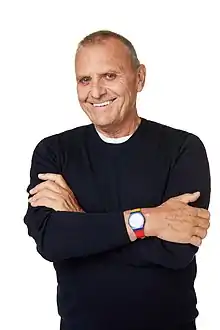Jean-Charles de Castelbajac
Jean-Charles, marquis de Castelbajac[1] (also known as JC/DC,[2] born 28 November 1949 in Casablanca, Morocco) is a fashion designer. He has enjoyed international success with some of his creations, including a coat of teddy bears worn by pop star Madonna[3] and by supermodel Helena Christensen in the film Prêt-à-Porter and a sequin jacket for Beyonce, and a Donald Duck costume for Rihanna. During his career he has befriended and worked with artists such as Andy Warhol, Keith Haring, Jean Michel Basquiat, Malcolm McLaren, Robert Mapplethorpe, M.I.A, Cassette Playa, Curry & Coco, The Coconut Twins and Lady Gaga.
Jean-Charles de Castelbajac | |
|---|---|
 | |
| Born | 28 November 1949 |
| Nationality | Moroccan/French |
| Children | Louis-Marie de Castelbajac, Guilhem de Castelbajac, Eugénie de Castelbajac |
| Website | www |
His fashion archive was showcased in preparation for his retrospective "Gallie Rock" in Paris by photographers Tim and Barry, modelled by Cassette Playa, M.I.A., Jammer, Matthew Stone, Slew Dem Crew, and more.[4]
His creations have been displayed at New York’s Institute of Fashion and Technology, London’s Victoria&Albert Museum and the Galliera Museum in Paris. In 2015, he created a 3700 m2 mural for Orly airport in Paris.
As well as his imaginative clothing collections,[1][2] the designer creates home furnishings [3] and has designed a watch inspired by the childhood favourite, Lego. He also has collaborated with Swatch, Weston, Ligne Roset, Petit Bateau, Citroën, Tecnica, Kway, Coca-Cola, Vilebrequin, Aigle and Palace skateboards.
All the artistic environments he touches on have his signature rainbow chromatic range in common. One of the best examples of this is the line he created for Pope John Paul II, 500 bishops and 5000 priests for World Youth Day in Paris in 1997.
As Keith Haring initiated him to street-art, Jean-Charles de Castelbajac uses chalk to leave his poetic mark on the walls of the world’s capitals.
His career as a fashion designer started in 1968 alongside his mother, when he created Ko & Co. The first ‘manifesto’ piece of clothing he produced was a coat he made, using the blanket he used when he was at boarding school. He founded maison Jean-Charles de Castelbajac in 1978, which he left in 2016.
Between the 70’s and the 90’s, Jean-Charles de Castelbajac was also the artistic director of prestigious fashion houses like Max Mara and Courrèges and he co-founded Iceberg in 1974. In 1979, in consonance with pop art, he designed cartoon pullovers that have since become iconic.
In 2005, Raika was the de Castelbajac ready-to-wear license holder in Japan with retail value of €20 million.[5] He also attended King of kitsch at Paris Fashion Week in 2010.
In 2017, he collaborated with smartphone maker OnePlus to release a collection called the "Callection"[6] that was centred around a limited edition OnePlus 5 smartphone.
In 2018, he was named artistic director for the Benetton Group.[7]
In 2019, he collaborated with Palace Skateboards to release a collection featuring clothing, hats, and playing cards.[8]
References
- Hilary Alexander (10 May 2005). "In the front row: behind the scenes at Paris Fashion Week". The Daily Telegraph.
Jean-Charles de Castelbajac, French fashion's only marquis, is looking forward to the major retrospective of his 45-year career at the Victoria and Albert Museum in January. De Castelbajac pioneered Snoopy and Mickey Mouse fashion, made coats out of teddy bears, took inspiration from artists such as Keith Haring, and designed Eddie Murphy's costumes for his starring role in Coming to America in 1988.
- Diane Pernet (February 2007). "IQONS Interview with JC de Castelbajac". IQONS.com. Archived from the original on 2007-09-27.
The most amazing adventure of JC/DC’s life so far was when he was asked to dress 5,000 priests, 500 bishops and the Pope for their visit in Paris. The theme of the collection was the rainbow based on the story of Noah and the arc. God spoke to Noah and told him that "if you see the rainbow in the sky there will be peace between me and the human race". The idea went over well but JC/DC thought it best to inform the Bishop that the rainbow was also the symbol of the gay community. The Bishop’s reaction was not one of shock rather he said that nobody owned the copyright on the rainbow and that was that. Once the work was completed the Pope spoke to JC/DC: "Young man, you have used colour as a cement of faith."
- Victoria and Albert Museum (2006). "POPAGANDA: The Fashion & Style of JC de Castelbajac". Archived from the original on 2007-07-01.
An inspired collaborator, his design work includes ready-to-wear as well as cars, sportswear and interiors. A fashion star of the 1970s and 1980s, his idiosyncratic designs mix bright colours, popular culture and humour. The mid-1970s saw him dress Farrah Fawcett for the hit TV series Charlie's Angels and collaborating with Mick Jagger and Elton John. His rainbow flag vestments for the Pope earned him further fame.
- "Paris Fashion Week: Jean-Charles de Castelbajac SS 08 - modabot". www.modabot.de.
- Chevalier, Michel (2012). Luxury Brand Management. Singapore: John Wiley & Sons. ISBN 978-1-118-17176-9.
- "OnePlus & JCC+ – A Fusion of Art and Tech". oneplus.net. Retrieved 2017-09-25.
- "Jean-Charles de Castelbajac new Benetton artistic director". Fashion United. Retrieved 4 December 2019.
- PALACE / JEAN-CHARLES DE CASTELBAJAC, https://www.palaceskateboards.com/palace-jean-charles-de-castelbajac/